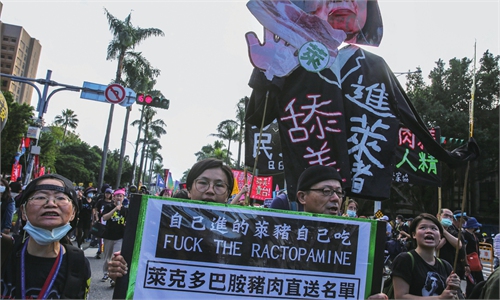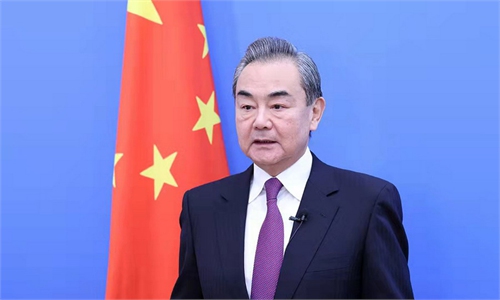
Eight countries have severed 'diplomatic ties' with Taiwan during Tsai Ing-wen's terms in office. Graphic: Xu Zihe/GT
If you rejoice and feel relieved after a friendship ends, it means that you didn't care about that friend at all.That is the message from an article in the Taipei Times on Monday: When the island of Taiwan loses its "allies," it makes Taiwan rise, because this creates "more sympathetic, knowledgeable voices for Taiwan," and since few of these "allies" are important to Taiwan economically and even cost money, losing them has little effect on Tsai Ing-wen's standing with the Taiwan public. Taiwan and its "allies" and "partners" could also take this opportunity to argue that the Chinese mainland was marginalizing the island's "democratic" friends, according to some observers.
It is not surprising that such views appeared in Taiwan media. Since Tsai took office as Taiwan's regional leader in 2016 and took the radical secessionist policies, she should have long foreseen trajectory of Taiwan's "diplomatic" relations - the number of countries Taiwan has "diplomatic" ties with is bound to decline. To avoid the embarrassment from the fact that Taiwan is losing its "allies," the Democratic Progressive Party (DPP) authorities have always hyped the theory that "diplomatic ties are useless," which echoes the viewpoint in the Taipei Times article. It claims that the money spent on maintaining ties with those countries could be better used if spent on running ties with the US.
On the other hand, the DPP authorities hyped the "China suppression" theory. It does not reflect on its policy toward the mainland or its reluctance to admit the 1992 Consensus, but tries to shift the blame on the mainland by accusing the latter of suppressing Taiwan on the world stage.
But all this rhetoric is nothing but a placebo. Some Taiwan people can soothe themselves by saying that the broken ties could help Taiwan's rise or even help the island shake off the name of "the Republic of China" to pave its way toward "independence." Over the years, the DPP authorities have been trying to leave off the "one China" principle recognized by the international community.
Nonetheless, its petty maneuvers will only prove to be futile. There is only one China in the world, recognized by the UN Resolution 2758. Taiwan is not a country, but an inalienable part of China's territory. Even its "closest" partner, the US, sticks to the "one China" policy on official occasions. In addition, the US only views Taiwan and its relations with the island as a tool to contain the Chinese mainland.
Now Taiwan politicians and scholars can only hide their feeling of loss toward the fact that Taiwan is losing more and more "allies."
A nation needs diplomatic ties to prove its nature as a sovereign state. It is not that Taiwan does not want to maintain relations with those countries. Its annual budget includes expenditure on developing ties with those countries. But it is not up to neither Taiwan nor the US to determine whether these ties could be maintained.
Those countries make decisions based on the assessment of their overall national interests, rather than just economic ties with Taiwan. From another angle, it can be said that what the DPP authorities have been doing to Taiwan is to make it hollow.
From a short-term perspective, the decreasing number of countries that have "diplomatic" ties with Taiwan is the biggest test for the governance of Tsai. It proves exactly otherwise when Tsai boasts of her "diplomatic" achievements.
From a long-term point of view, this is the necessary stage of the reunification across the Taiwan Straits.
The fact that Taiwan's "allies" are breaking ties with it and developing relations with the Chinese mainland is the long-term trend that the one-China principle is adhered to by the international community.
The author is a research fellow at the Institute for Taiwan, Hong Kong and Macao Studies of the Shanghai Institutes for International Studies. opinion@globaltimes.com.cn


